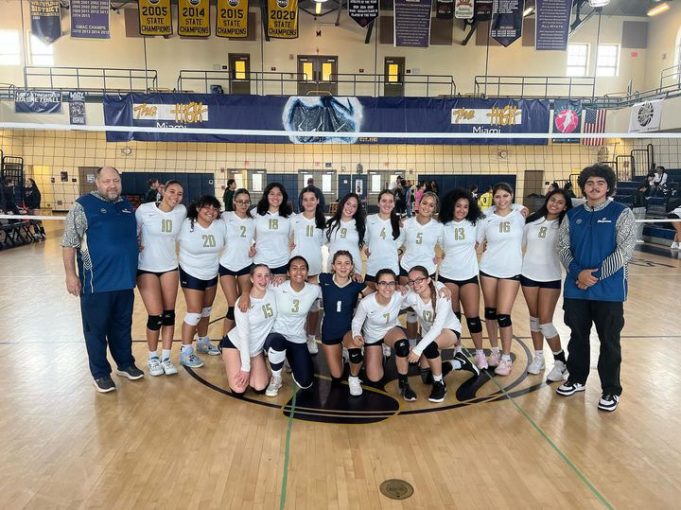Is Global Warming Real or Not?

October 26, 2017
If you haven’t heard it before, then you’ll hear it again.“Global warming is a natural occurring event,” said biology teacher Mr. Sanchez. The National Resources Defense Council said that over the past 50 years, the average global temperature has increased at the fastest rate ever recorded in history. Experts also see it accelerating. Should we be concerned?
Is global warming an issue we should worry about?
Whether global warming is happening now or later, it’s an issue we should worry about. According to NASA,“The ocean has warmed about 0.3 degrees Fahrenheit since 1969.”
Did you know that our current rate of sea level rise is about 3mm per year? With glaciers and parts of Greenland’s ice sheets melting, it’s starting to become an important issue.
Penn State climatologist Richard Alley explains the real concern for the buildup of greenhouse gases is that “we’re getting more energy from the sun than we’re sending back into space.” That energy is not only warming the atmosphere but it’s also melting the ice and warming the oceans. What could this mean for Florida later in the future?
Are you personally concerned about global warming?
Students at Miami High have different opinions. Senior Durhan Chavez is concerned due to global warming. “Our winters are barely cold, and our summers are getting hotter,” he said.
On the other hand, senior Pedro Ramos said,“I’m personally not concerned. Throughout our geological history, there have been both periods of global warming and cooling cycles. Our generation happens to be involved in the warming period, but eventually there will be cooling, so we won’t burn to a crisp.”
Can we slow or even reverse global warming? How? Why not?
One way to to slow or even reverse global warming is through reduce, reuse and recycle which conserves natural resources, landfill space, and energy. Cyan James, a junior, said, “We cannot reverse global warming. The damage is already done but we can slow it down, by stopping deforestation.” Meanwhile, Adrian Brunda, another junior, says, “We can slow global warming if we reduce the amount of greenhouse gases in the atmosphere to the point where the earth can recover and global warming can be reversed.”
Freshmen Camila Sanchez said, “To reduce global warming we must stop wasting water, drive fuel-efficient cars and even buy better light bulbs.”
According to The National Resource Defense Council (NRDC), every year, 33 million acres of forests are cut down. Timber harvesting in the tropics alone contributes 1.5 billion metric tons of carbon to the atmosphere, when represents 20 percent of human made greenhouse gas emissions. NRDC goes on to say that by improving our agricultural practices, paper recycling, and forest management, we could balance the amount of wood taken out with the amount of new trees growing. It will quickly eliminate the amount of emissions.
Do you see yourself living in Miami in the next ten years?
Regardless of whether they believe in global warming or not, many students at Miami High do not plan to stay in Miami. Junior Raymmond Buddiered said he won’t live here but plans to live in the state of Florida because he does believe Florida will still exist.
However, senior Carlos Zarruk will not. He said, “Facts show that the sea level will rise more than it has and more natural disasters are going to come our way.” Andrew Kamenov from Citydata.com anticipates a 2-foot increase in the sea level in Florida by 2060. He adds that within the century, a combination of polar melting, carbon emissions and ice sheets collapsing could cause chronic flooding that will wipe out Miami.
Are humans causing or contributing to global warming?
Everyday we contribute to global warming, but does that mean that humans are causing it?
According to The Intergovernmental Panel on Climate Change (IPCCC), a group of 1,300 independent scientific experts from countries all over the world,in its Fifth Assessment Report, “There’s a more than 95 percent probability that human activities over the past 50 years have warmed our planet.”
Everyday we drive our cars, take buses, and travel in airplanes without even realizing that we are contributing. Since technology is advancing, we might stop using paper which could reduce our carbon footprints. There are so many simple things such as recycle, drive less, use less hot water, go solar and so much more that we can do to help our planet.






Abel • Nov 2, 2017 at 10:39 pm
I like how it’s Straight to the point. And now I’m currently concerned about global warming.
Osman • Nov 2, 2017 at 10:16 pm
This was very interesting because it talks about the important information about global warming gives good facts very interesting topic to know more and understand more about global warming. But in my opinion I would like to hear more conversational Topics
Kelly • Nov 2, 2017 at 10:15 pm
Very interesting story.